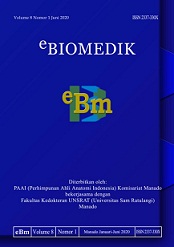Isolasi dan Identifikasi Bakteri Resisten Merkuri di Pesisir Laut Buyat
Abstract
Abstract: Mercury (Hg) is a type of metal that is commonly found in nature and scattered in the rocks, ore mines, soil, water, and air as inorganic and organic compounds. Mercury is dangerous to our health because it can be methylized into methyl mercury (MeHg), which is toxic to human body. The detoxification of mercury can be done by using microorganisms that are resistant to mercury. One of the microorganisms that arre resistant to mercury is bacteria. This study was aimed to identify the types of bacteria in soil sediments at Buyat bay that were resistant to mercury. This was a descriptive exploratory study with a cross-sectional design. The results showed that bacterial colonies could still grow in culture medias of 5, 10, and 20 ppm of phenyl mercury. Identification of the bacteria resulted in Streptococcus sp, Pseudomonas sp, Bacillus sp, Echerchia Sp, and Klebsiella sp. In conclusion, at Buyat bay, there were five species bacteria that were resistant to 5, 10 and 20 ppm concentrations of mer-cury, namely, Streptococcus sp, Pseudomonas sp, Bacillus sp, Echerchia Sp, and Klebsiella sp.
Keywords: bacteria, mercury resistance, soil sediments
Abstrak: Merkuri (Hg) ialah salah satu jenis logam yang banyak ditemukan di alam dan tersebar dalam batu-batuan, biji tambang, tanah, air dan udara sebagai senyawa anorganik dan organik. Merkuri merupakan senyawa yang berbahaya karena dapat bermetilisasi menjadi metil merkuri (MeHg) yang bersifat toksik bagi tubuh manusia. Upaya detoksifikasi merkuri dapat dilakukan antara lain menggunakan mikroorganisme yang resisten terhadap merkuri. Salah satu mikroorganisme yang tahan terhadap merkuri ialah bakteri. Penelitian ini bertujuan untuk mengidentifikasi jenis bakteri resistensi merkuri yang terdapat pada sedimen tanah di perairan pantai Buyat. Jenis penelitian ialah deskriptif eksploratif. Hasil penelitian menda-patkan bahwa masing-masing konsentrasi fenil merkuri hingga 20 ppm menunjukkan adanya pertumbuhan koloni bakteri, yaitu Streptococcus sp, Pseudomonas sp, bacillus sp, Escherichia Sp, dan Klebsiella sp. Simpulan penelitian ini ialah di pesisir laut Buyat terdapat lima jenis spesies bakteria yang resisten terhadap merkuri, yaitu Streptococcus sp, Pseudomonas sp, bacillus sp, Escherichia sp, dan Klebsiella sp
Kata kunci: bakteri, resistensi merkuri, sedimen tanah
Full Text:
PDFDOI: https://doi.org/10.35790/ebm.v7i2.25505
Refbacks
- There are currently no refbacks.





